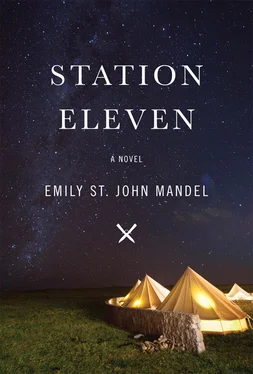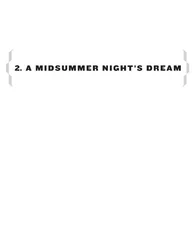The conductor stepped back. “Absolutely not,” she said. “It’s out of the question.”
The prophet stared at her for a moment before he turned away. He murmured something to a man in the front row, the archer who’d been guarding the gas station that morning, and they walked together away from the Walmart.
“Luli!” the prophet called over his shoulder, and the dog trotted after him. The audience was dispersing now, and within minutes the Symphony was alone in the parking lot. It was the first time in memory that no one from the audience had lingered to speak with the Symphony after a performance.
“Quickly,” the conductor said. “Harness the horses.”
“I thought we were staying a few days,” Alexandra said, a little whiny.
“It’s a doomsday cult.” The clarinet was unclipping the Midsummer Night’s Dream backdrop. “Weren’t you listening?”
“But the last time we came here—”
“This isn’t the town it was the last time we were here.” The painted forest collapsed into folds and fell soundlessly to the pavement. “This is one of those places where you don’t notice everyone’s dropping dead around you till you’ve already drunk the poisoned wine.” Kirsten knelt to help the clarinet roll the fabric. “You should maybe wash that dress,” the clarinet said.
“He’s gone back into the gas station,” Sayid said. There were armed guards posted on either side of the gas station door now, indistinct in the twilight. A cooking fire flared by the motel.
The Symphony was on their way within minutes, departing down a back road behind the Walmart that took them away from the center of town. A small fire flickered by the roadside ahead. They found a boy there, a sentry, roasting something that might have been a squirrel at the end of a stick. Most towns had sentries with whistles at the obvious points of entry, the idea being that it was nice to have a little warning if marauders were coming through, but the boy’s youth and inattention suggested that this wasn’t considered an especially dangerous post. He stood as they approached, holding his dinner away from the flames.
“You have permission to leave?” he called out.
The conductor motioned to the first flute, who was driving the lead caravan — keep moving — and went to speak with the boy. “Good evening,” she said. Kirsten stopped walking and lingered a few feet away, listening.
“What’s your name?” he asked, suspicious.
“People call me the conductor.”
“And that’s your name?”
“It’s the only name I use. Is that dinner?”
“Did you get permission to leave?”
“The last time we were here,” she said, “no permission was required.”
“It’s different now.” The boy’s voice hadn’t broken yet. He sounded very young.
“What if we didn’t have permission?”
“Well,” the boy said, “when people leave without permission, we have funerals for them.”
“What happens when they come back?”
“If we’ve already had a funeral …,” the boy said, but seemed unable to finish the sentence.
“This place,” the fourth guitar muttered. “This goddamned hellhole.” He touched Kirsten’s arm as he passed. “Better keep moving, Kiki.”
“So you wouldn’t advise coming back here,” the conductor said. The last caravan was passing. Sayid, bringing up the rear, seized Kirsten’s shoulder and propelled her along the road.
“How much danger do you want to put yourself in?” he hissed. “Keep walking.”
“Don’t tell me what to do.”
“Then don’t be an idiot.”
“Will you take me with you?” Kirsten heard the boy ask. The conductor said something she couldn’t hear, and when she looked back the boy was staring after the departing Symphony, his squirrel forgotten at the end of the stick.
The night cooled as they left St. Deborah by the Water. The only sounds were the clopping of horseshoes on cracked pavement, the creaking of the caravans, the footsteps of the Symphony as they walked, small rustlings from the night forest. A fragrance of pine and wildflowers and grass in the air, the stars so bright that the caravans cast lurching shadows on the road. They’d left so quickly that they were all still in their costumes, Kirsten holding up her Titania dress so as not to trip over it and Sayid a strange vision in his Oberon tuxedo, the white of his shirt flashing when he turned to look back. Kirsten passed him to speak with the conductor, who walked as always by the first caravan.
“What did you tell the boy by the road?”
“That we couldn’t risk the perception of kidnapping,” the conductor said.
“What did the prophet say to you after the concert?”
The conductor glanced over her shoulder. “You’ll keep this to yourself?”
“I’ll probably tell August.”
“Of course you will. But no one else?”
“Okay,” Kirsten said, “no one else.”
“He suggested that we consider leaving Alexandra, as a guarantee of future good relations between the Symphony and the town.”
“Leaving her? Why would we …?”
“He said he’s looking for another bride.”
Kirsten dropped back to tell August, who swore softly and shook his head. Alexandra was walking by the third caravan, oblivious, looking up at the stars.
Sometime after midnight the Symphony stopped to rest. Kirsten threw the Titania gown into the back of a caravan and changed into the dress she always wore in hot weather, soft cotton with patches here and there. The reassuring weight of knives on her belt. Jackson and the second oboe took two of the horses and rode back along the road for a mile, returned to report that no one seemed to be following.
The conductor was studying a map with a few of the older Symphony members in the moonlight. Their flight had taken them in an awkward direction, south down the eastern shore of Lake Michigan. The only reasonably direct routes to their usual territory took them either back through St. Deborah by the Water, or close by a town that had been known to shoot outsiders on sight, or inland, through a wilderness that in the pre-collapse era had been designated a national forest.
“What do we know about this particular national forest?” The conductor was frowning at the map.
“I vote against it,” the tuba said. “I know a trader who went through there. Said it was a burnt-out area, no towns, violent ferals in the woods.”
“Charming. And the south, along the lakeshore?”
“Nothing,” Dieter said. “I talked to someone who’d been down there, but this was maybe ten years ago. Said it was sparsely populated, but I don’t remember the details.”
“Ten years ago,” the conductor said.
“Like I said, nothing. But look, if we keep going south we’ll eventually have to turn inland anyway, unless you’re especially eager to see what became of Chicago.”
“Did you hear that story about snipers in the Sears Tower?” the first cello asked.
“I lived that story,” Gil said. “Wasn’t there supposed to be a population to the south of here, down by Severn City? A settlement in the former airport, if I’m remembering correctly.”
“I’ve heard that rumor too.” It wasn’t like the conductor to hesitate, but she studied the map for some time before she spoke again. “We’ve talked about expanding our territory for years, haven’t we?”
“It’s a risk,” Dieter said.
“Being alive is a risk.” She folded the map. “I’m missing two Symphony members, and I still think they went south. If there’s a population in Severn City, perhaps they’ll know the best route back to our usual territory. We continue south along the lakeshore.”
Kirsten climbed up to the driver’s seat on the second caravan, to drink some water and to rest. She shrugged her backpack from her shoulders. Her backpack was child-size, red canvas with a cracked and faded image of Spider-Man, and in it she carried as little as possible: two glass bottles of water that in a previous civilization had held Lipton Iced Tea, a sweater, a rag she tied over her face in dusty houses, a twist of wire for picking locks, the ziplock bag that held her tabloid collection and the Dr. Eleven comics, and a paperweight.
Читать дальше












